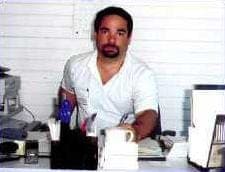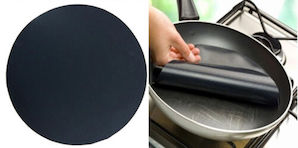
-----
What ferrous material is fully resistant to hydrochloric acid?
ACRONYMS:
HCl = hydrochloric acid
Q. Can anybody suggest which metal is most suitable to work in contact with HCl acid?
Thanks
Mazhar
Mechanical Engineer - Dubai (U.A.E)
February 18, 2008
A. Hi, Mazhar. You can probably rule out all of the common grades of stainless steel. But I think you will have to describe the concentration, the trace contaminants like copper, and the temperature and exposure conditions before an actual material selection can be made. Good luck.

Ted Mooney, P.E.
Striving to live Aloha
finishing.com - Pine Beach, New Jersey
Ted is available for instant help
or longer-term assistance.
A. Hi Mazhar Ahmed,
The best metal would be Hastelloy-B, having a corrosion rate of <0.02 inches/year according to Chemical Engineers Handbook
[adv: suggestions on
Amazon,
AbeBooks, or
eBay affil links]
; Properties of Materials, Table:23-4.
Your next best material would be a polyester or polyethylene tank supported externally with a steel structure which you would coat with a thick epoxy paint.
Good luck,
technical consultant - Newton, North Carolina
![]() Thanks Bob. Mazhar should note, however, that Hastelloy-B has only 2% Fe so it's not really a ferrous alloy. He may be looking for a construction material for a tank, but might not be.
Thanks Bob. Mazhar should note, however, that Hastelloy-B has only 2% Fe so it's not really a ferrous alloy. He may be looking for a construction material for a tank, but might not be.
Luck & Regards,

Ted Mooney, P.E.
Striving to live Aloha
finishing.com - Pine Beach, New Jersey
Ted is available for instant help
or longer-term assistance.
Q. I have an application where I need to heat concentrated HCl to about 90° C. I am not getting the correct metal which can resist hot conc. HCl. At present I am doing in a glass vessel. Glass lining is very costly. Can I use SS 316L or any other metal or alloy that can withstand HCl? Also from where can I get this alloy.
Amit Kumar- Surat India
April 22, 2012
A. Hi Amit.
Hastelloy-B might work but probably costs more than a glass-lined vessel. Unfortunately, HCl at 90°C is both very corrosive to all relatively affordable metals, and too hot for most inexpensive plastic construction materials.
Luck & Regards,

Ted Mooney, P.E.
Striving to live Aloha
finishing.com - Pine Beach, New Jersey
Ted is available for instant help
or longer-term assistance.
Multiple threads merged: please forgive chronology errors and repetition 🙂
Q. I am running a process that has Hydrochloric acid gas as a result of a chemical reaction in a welded constructed box that will be made from one of the above materials. This process will be running 24 hours a day, 5 days a week, for 8-10 years. The box temperature will be 65 ±2 °F. I need to know the best type of material to use and/or the coating needed to protect it from the HCl acid gas condition.
Is there a coating for aluminum or stainless steel that will resist HCl gas in these conditions?
Hugh Walton- Auburn Hills, Michigan, USA
2001
A. Hugh !
Well, there are not many metals that will stand HCl over a short or a long time including 316 ss. Maybe Hastelloy C, Carpenter 20 and Titanium ... that's if you've got lots of $$$ ... which you must have if you don't want an alternative.
There is a simpler solution, a very low cost idea. That is to use plastics ... and most plastics should take that low temperature HCl till the cows come home.
Use PVC, ABS, PP, PE ... and for more $$$, use CPVC, PVDF and the weldable fluorocarbons... even fiberglass (but don't use boat resins!).
The other side of the coin is that I'd assume your 'gas' will contain some moisture ... and if you exhausting that to atmosphere you'll not only have a corrosion problem, but ah, you may have to 'scrub' the fumes! And if that is necessary, oh dear, you'll need a fan and some sort of scrubbing arrangement. And even if your HCl gas doesn't contain any moisture, it sure WILL when it hits the outside air.
Cheers !

Freeman Newton [deceased]
(It is our sad duty to advise that Freeman passed away
April 21, 2012. R.I.P. old friend).
A. Hi Hugh,
For your HCl fume resistant material, you can choose Hastelloy with PTFE coating. Since operating temperature is 65 °C this coating may resist long. You can also try fiberglass lining, but porosity is to be controlled.
Teflon is also a good solution but rigidity is to be seen.
Best may be the first option.
Sundar
- Alkhobar, Saudi Arabia
![]() Thanks, readers. Some good answers are doubtless being offered on this page, but I think there is room for somewhat less abstract questions.
Thanks, readers. Some good answers are doubtless being offered on this page, but I think there is room for somewhat less abstract questions.
When the proposed answers range from dirt cheap polyethylene to outrageously expensive teflon-coated Hastelloy-B the questions are probably a bit too vague :-)
Luck & Regards,

Ted Mooney, P.E.
Striving to live Aloha
finishing.com - Pine Beach, New Jersey
Ted is available for instant help
or longer-term assistance.
Q. I'm also looking for solution to this problem but the only difference is instead of HCl gas, its HCl in liquid form. Your suggestion on using plastics is feasible but my additional problem is I need that plastic to be conductive with low voltage high current typically found in metal electrodeposition such as zinc, gold, copper, etc. on ferrous metals. Any suggestions?
Anthony Austria- Philippines
2001
A. Hi Anthony,
A conductive plastic? Well, I guess that they might exist and recall the 'tanker' companies back in ye olden days oxidizing some plastic cladding to make it conductive in order to safely ground a load.
I've got but one idea. That's to use Carbon Fibre ... I've never used the stuff, nor seen it, for that matter. You will know that a matrix of that and an epoxy or polyester gives an enormously strong structure (satellite components, racing car bodies, hi tech hockey sticks, golf clubs, fishing rods, etc.).
But it's CARBON fibre ... and surely carbon must be conductive.
Hence, if you had your tank made out of (FRP) fiberglass and could line the 'inside' with some exposed carbon fibre, that should work but would not if the C.F. were fully resin coated,
Solution: Get a FRP tank made with a coarse and unfinished interior (in order to get a good bond to which you won't get if it's a good and shiny resin rich surface). Obtain the coarsest carbon fibre you can buy, ideally woven roving. 'Glue' that carefully to the inside using resin BUT don't fully coat that material, leave the 'outside', so-to-speak, uncoated so that exposed C.F. is showing. Now you should have a 100% conductive surface.
That's the best I can do to help you. I hope it works.
Cheers !

Freeman Newton [dec.]
R.I.P. old friend (It is our sad duty to
advise that Freeman passed away 4/21/12)
Q. I too am facing the same problem -- unable to find the right material resistant to HCl @700°C?
Tried ceramics: failed. If you have any suggestion I will really be grateful.
- Mumbai, Maharashtra, India
2005
Q. I have the same problem. I have a rubber lined agitated vessel to digest rock phosphate with HCl. However, the life of the agitator lining as well as vessel lining is very short due to abrasive nature of system. Rock phosphate normally has unreacted silica/quartz. What material/coating/lining is suggested?
Ikram ul Haqfertilizers - Lahore, Punjab, Pakistan
August 16, 2008
A. Hi Ikram.
UHMWPE is often specified for good abrasion and chemical resistance, and tanks can be built from it (although you'll need to look into the fabrication methods & details). The agitator blades might be made of Hastelloy-B or tantalum. The agitator shaft can probably remain rubber-lined, or be teflon lined.
Luck & Regards,

Ted Mooney, P.E.
Striving to live Aloha
finishing.com - Pine Beach, New Jersey
Ted is available for instant help
or longer-term assistance.
Q. HI, MY NAME IS FRANSWA FROM SOUTH AFRICA.
I'VE GOT A NEW LEACHING PLANT THAT I'VE RECENTLY BUILT WHERE I ACTUALLY LEACH MY PRODUCT IN CONTAINERS FULL OF HYDROCHLORIC ACID THAT GETS BOILED ON A HOTPLATE THAT'S INSIDE THE LEACHING CABINET. HOWEVER IF THERE IS A SPILLAGE OF ACID, IT DAMAGES THE HOTPLATES. WHAT MATERIAL CAN BE USED FOR COVERING THESE HOTPLATES THAT CAN ACTUALLY HANDLE THE HEAT AS WELL AS BEING HCl-PROOF. I WOULD BE GLAD IF THIS COMMUNITY OF PEOPLE CAN ASSIST ME. IT WOULD BE HIGHLY APPRECIATED.
engineering projects - springs, gauteng, south africa
April 6, 2011
A. Hi, Franswa.
I have seen teflon "pan liners" that might serve your needs, and they're quite cheap :-)
Regards,

Ted Mooney, P.E.
Striving to live Aloha
finishing.com - Pine Beach, New Jersey
Ted is available for instant help
or longer-term assistance.
Need low cost alternative to Hastelloy B for Boiling HCl Acid
Q. Hello Guys,
If anybody can help me to suggest some material which will stand 110 °C in Boiling acid like HCl as an alternative to carry out Pickling of Titanium sheets. Hastelloy is an option but I don't want to go for that because of the cost.
- Abu Dhabi UAE
December 16, 2013
A. Hi Tauseef. Why not Teflon or similar lining material?
If PTFE linings won't do, please investigate Tantaline or a similar coating/cladding process, as only tantalum and the precious metals are more resistant to HCl than Hastelloy to my knowledge. Tantalum coated stainless steel is reportedly significantly less expensive than Hastelloy.
Regards,

Ted Mooney, P.E.
Striving to live Aloha
finishing.com - Pine Beach, New Jersey
Ted is available for instant help
or longer-term assistance.
Need to find a conductive metal resistant to concentrated hydrochloric acid
Q. Hello
I am trying to find a metal/ alloy that will conduct electricity but at the same time not corrode when exposed to Concentrated Hydrochloric Acid.
Is there such a metal?
Temperature could vary from 25 to 200 °C. A corrosion rate of o.ox mm a year is what I am looking for.
Thanks,
Consumer - Aberdeen, Scotland, United Kingdom
2007
A. Gold.

Robert H Probert
Robert H Probert Technical Services
Garner, North Carolina

A. Gold, Platinum and other precious metals meet your requirement.
Guillermo MarrufoMonterrey, NL, Mexico
A. As one should always assume, responses here should not be assumed to be consulting responses that assume any responsibility for outcomes.
Virtually all metals and alloys of metals conduct electricity. The next question is, How well do you need it to conduct?
As far as being resistant to hydrochloric, up to 200 °C, I don't have any references that cover metals in HCl beyond its boiling point. The boiling point varies with concentration but peaks at ~230 °F or ~110 °C. If the boiling point is satisfactory, then an older volume of "Corrosion Engineering" by Fontana and Greene ⇨
shows that Chlorimet 2, Tantalum, Hastelloy B (if the solution is free of chlorine), Zirconium, Silver, Platinum, and a grade of material called Impervious graphite, will all contain this acid from room temperature and low concentration up to 40% and boiling. Out of these, silver is by far the best electrical conductor.
Pfaudler 53 glass (presumably non-conductive) is shown as resistant at higher temperatures, where it would need to be under pressure.
Impurities, or aeration of the acid, may affect the resistance of its container to attack.
I would recommend retaining an expert in your locality to deal with this hazardous material.

Paul Tibbals, P.E.
gas & electric
San Ramon, California, USA
(My opinions are not related to nor a statement of my employer's)
2007
A. Tantalum is compatible with concentrated (38%) hydrochloric acid to 200 °C according to compatibility guides. Its conductivity is about 1/5 that of gold but slightly higher than that of Pt.
Ken Vlach [deceased]- Goleta, California
Rest in peace, Ken. Thank you for your hard work which the finishing world, and we at finishing.com, continue to benefit from.
A. I think that Titanium metal is suitable and cheap& will fulfill your requirement. For which process do you want?, please explain clearly.
Rabish Kumar Dubey- Mumbai, India
!!. I do not agree with the last posting. Titanium is attacked by hot hydrochloric acid.
Guillermo MarrufoMonterrey, NL, Mexico
!! Titanium is not resistant in reducing acid applications, such as hydrochloric or sulfuric acid.
Rick Young- Kokomo, Indiana, USA
December 19, 2013
Q. I need to produce hydrochloric acid in a concentration grade of 25%-30% in a very small scale of one gallon a week according to one of these formulas:
1)NaCl+NaHSO4+->Na2SO4+HCl
2)2NaCl+H2SO4->Na2SO4+2HCl
The problem is that the material to construct the reactor all are based on the HASTELLOY-B-3 OR HASTELLOY C276, which are very expensive (one square meter costs 3330$)
So my question is:
If there is any material that may substitute for those alloys (some kind of composite material or an heat resisting glass) that would be cost effective and would resist the corrosion and temperature required for the HCl production?
I need it urgently for refining precious metal.
Thak you for your collaboration.
quimecua - guayaquil, Ecuador
September 23, 2015
For that quantity I would use standard laboratory glassware.
5 Litres is a common size
A quick web search of laboratory suppliers Equador offered several options

Geoff Smith
Hampshire, England
A. If you can buy sulfuric acid, why not buy HCl. It would probably end up cheaper and would not be the problem with the Haz wastes.
HCl is available in glass up to 2.5 L and in plastic from 5 gal to 55 gal.
Pool acid is weaker but should be more readily available.
- Navarre, Florida
Q. Hi, I have an specific requirement for HCl 5% at 105 °C, which metallic materials can stand it at these conditions?
Camila MarínUniversity of Antioquia - Medellín, Antioquia, Colombia
February 23, 2017
A. Hi Camila,
One of the high corrosion resistant alloys, such as Inconel will probably be your best choice over a typical stainless alloy. Having anything fabricated from Inconel will be the difficult and expensive part.

Jim Conner
Mabank, Texas USA
A. You might want to evaluate Hastelloy C, or possibly monel.
Lyle Kirmanconsultant - Cleveland Heights, Ohio
A. Glass and enameled steel can withstand the hydrochloric acid.
Good luck

Khair Shishani
aircraft maintenance - Al Ain, UAE
Q. Does anyone have any experience of constructing a RCC Storage tank with suitable protection to store Hydrochloric Acid (30-34%) at 40-50 °C? HCl would have some soluble organics (Benzyl Chloride, Benzyl Dichloride, Benzaldehyde, Benzyl Alcohol) from 500-1000 ppm. I understand that neither FRP with normal vinyl ester resin nor any thermoplastic is suitable.
Vinod Trivedi- New Delhi, Delhi, India
June 7, 2017
Q. Hi I want to design a Reactor which uses hydrochloric acid in high concentration and in temperatures about 150 °C-200 °C and I have read everywhere about tantalum treated stainless steel and its cost effectiveness but my question is However tantalum corrosion rate is very small but on the other hand, in tantalum treated materials, tantalum would be a very thin layer on the surface of the main metal, therefore is the matter of time, can I use tantalum treated materials for a long time (like 10 years) contact with high concentration of HCl? How much time it can stand HCl?
Thanks
Sharif University of Technology - Tehran, Tehran, Iran
August 17, 2017
A. Hi Ahmad
There are usually many other factors in selecting a material but we do not know your detailed application.
If you must use metal, I would consider Monel, Hastelloy or Incolloy. All are expensive and may be difficult to obtain.
Have you considered lining the reactor with PTFE?
As an old chemist, my first choice would be glass readily available as components for almost any reactor configuration.

Geoff Smith
Hampshire, England
Q. Thank you, Geoff, for your answer; glass is not applicable because my system must handle pressure above 200 bar but PTFE lining is an interesting idea, but the question is what can I do for valves and fittings? what about places where reactor must join a pipe for input or output, Can PTFE lining protect the main body from corrosion in that places?
Ahmad Rabiee [returning]- Tehran,Iran
Hi Ahmad
I do not know if you can get them locally but PTFE lined fittings are readily available.
Search on "PTFE valves"
The specialist suppliers can advise on the most suitable lining and probably design the complete reactor for you using standard parts.

Geoff Smith
Hampshire, England
Pump seals for hydrochloric acid
Q. In our plant a fluorolined pump has a 1.375" mechanical seal gland plate of hylum material which creates leakage problems due to Hydraulic^hydrochloric acid.
Please suggest low cost & preventive material against HCl for gland plate.
UPL - Bharuch, Gujarat, India
July 21, 2018
Q. Please suggest the suitable material for compression spring of wire dia 0.30 mm and OD 5.00 mm, length 18.00 mm. The spring has to work in HCl 30% concentrated solution. SS316 wire is dissolving after few days of operation.
Manjunath CM- Bengaluru India
September 12, 2020
A. Manjunath,
I afraid you cannot find a reasonable Metal for such application. Gold, Platinum...?
Try to change the item (and change the item design) to plastic: Polyethylene, Polypropylene, PVDF, Teflon.
- Winnipeg, Canada
November 13, 2020
![]() Just a Comment:
Just a Comment:
I was reviewing the posted Q&A and I really admire the tenacity, patience and most of all the display of experience shared by those who provided their replies. Thanks for the unselfish replies, they are all informative and it's a unique experience in this Forum. Again, thanks to all, really.
Mechanical Piping - NEW YORK
September 29, 2023
Q, A, or Comment on THIS thread -or- Start a NEW Thread
